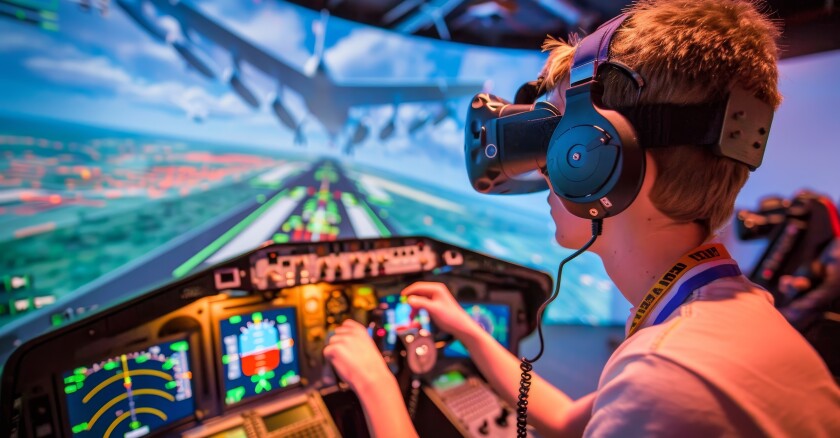The investment is part of a larger effort to provide students with hands-on, real-world skills. Funded by a combination of the American Rescue Plan and a federal Perkins grant, the new equipment is set to revolutionize how students engage with aviation and related industries.
"This is essentially an extension of what we've been doing since we received our initial grant from the South Dakota Department of Education," said Jade Temple, Douglas communications coordinator.
Douglas High received approximately $243,000, which was distributed across several programs. The flight simulator and virtual reality desktop simulators were among the primary purchases. Additional funds went toward welding equipment, a robotic welder, an industrial stove and oven for the cooking program, and virtual reality headsets for construction-related training.
The flight simulator, already installed and operational, was spearheaded by retired Master Sergeant Chet Stewart, an Aerospace Science instructor at the school. Stewart, a private pilot, aimed to create an aviation program that could provide career-focused training in response to a growing demand for pilots.
"When the grant opportunity came up, I knew I had to try. The worst they could do was say no," Stewart explained. "There's such a significant demand in aviation — both general and military —that I wanted to create an aviation program that could set students on a path toward these careers."
Stewart, a veteran of 11 years in teaching Air Force Junior ROTC, oversees the Aviation Honors Ground School. In the 16-week course, senior cadets are trained to take the FAA private pilot written exam. Successful cadets can begin the journey toward their private pilot's license, with the flight simulator playing a key role in their training.
"The simulator we received is an Advanced Aviation Training Device, which means cadets can log hours on it toward their private pilot's license," Stewart said. "Beyond that, if we have students who already have their private pilot's license, they can use the simulator to work on advanced ratings, such as their instrument or commercial certifications."
According to Stewart, in addition to the primary flight simulator, the school also acquired several DEFCON virtual flight simulators that are currently used for exploratory purposes.
"We've been allowing students to come in during lunch and try out different aircraft. It's been a fun way to introduce them to the basics of flying," Stewart said.
The Air Force Junior ROTC also offers a prestigious summer flight program, a nationwide initiative that gives highly qualified cadets the chance to earn their private pilot's license through a fully funded $40,000 scholarship. Last year, over 1,300 cadets applied, and around 300 were selected for the two-month program.
"We had four cadets from Douglas go through the program and earn their licenses, which was a great achievement for them," Stewart said.
Beyond aviation, the CTE grant supports various other programs at Douglas High School. A robotic welder and other welding equipment will provide valuable training for students interested in trade careers. At the same time, the industrial stove and oven will allow those in the cooking program to train with commercial-grade appliances. Virtual reality headsets will be used in construction programs, allowing students to gain experience in equipment management and building techniques through immersive simulations.
"We're still in the process of setting up some of this new equipment, but the potential it brings for student learning is incredible," Temple said. "The VR headsets, for instance, will allow students in construction to work on building management tasks and even virtual builds."
As the equipment continues to be implemented, Douglas High School's investment in its CTE programs is part of a larger effort to ensure students have the tools and experience necessary to pursue various career paths after graduation, Temple said.
"Our goal is to give students a career-focused education that prepares them for the workforce or further study," Temple explained. "Whether it's in aviation, welding, construction or culinary arts, we want them to leave here with practical skills and the confidence to succeed in their chosen fields."
©2024 Rapid City Journal, S.D. Distributed by Tribune Content Agency, LLC.









